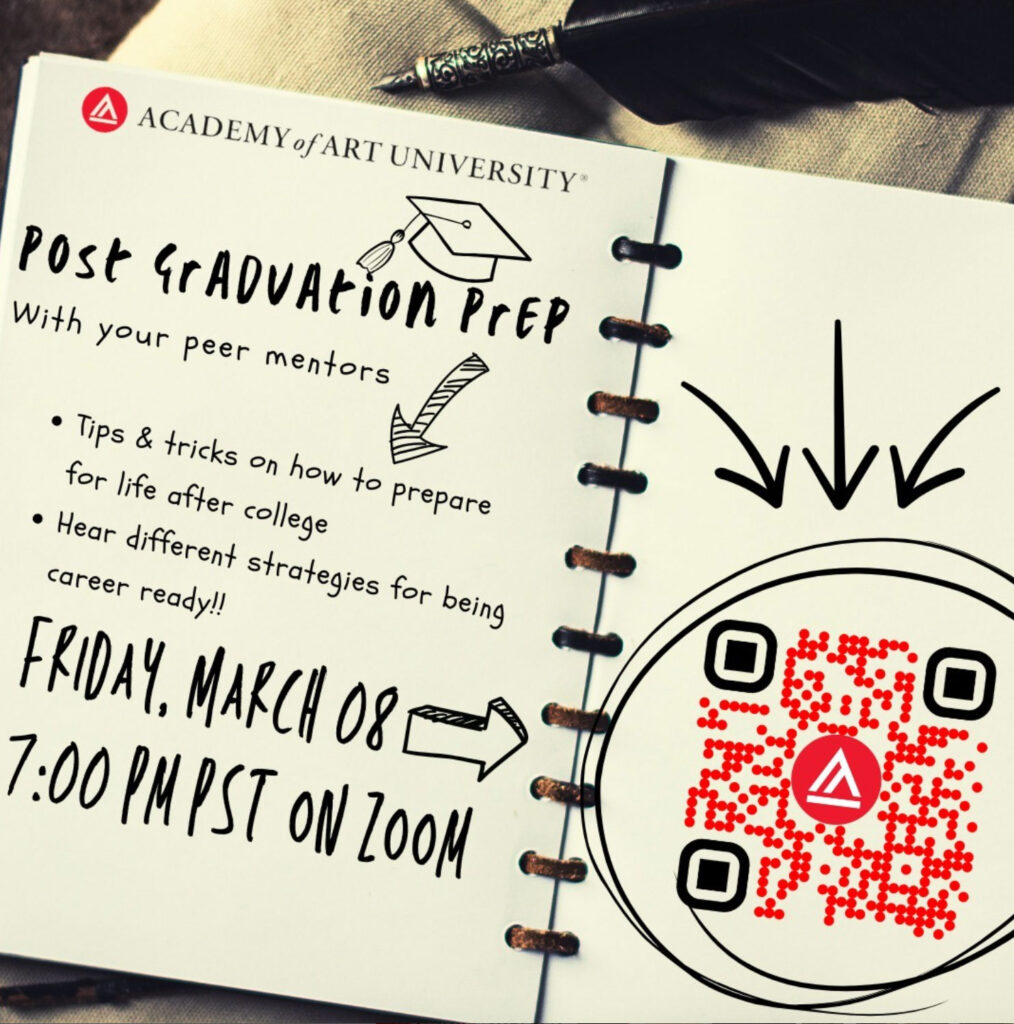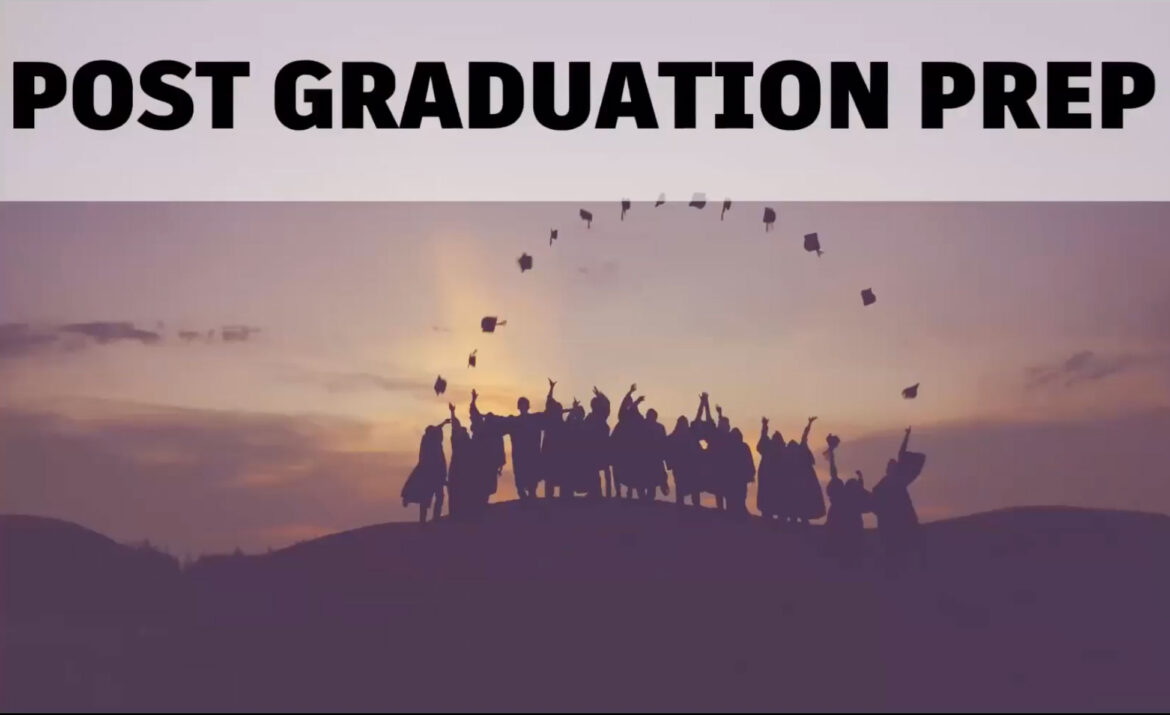By Rachel Reyna
In the spirit of graduation season, Academy of Art University Spring 2024 Peer Mentors Alina Jankowski, Missa Kato, Toby Winograd, and Travino Cordova, along with Executive Director of Career Development Lauren Spain, held a virtual Post-Graduation Prep Workshop over Zoom this past semester.
The well-organized workshop provided “tips and tricks” for soon-to-be Academy graduates preparing to enter the professional world. The Peer Mentors and Spain reviewed a number of topics with care as they offered advice and best practices in the lead-up to graduation.
Academy Peer Mentors are available to all Academy students and can be contacted for guidance regarding classes and post-Academy life.

Join a Professional Organization
Many organizations and associations have national and/or international chapters that offer discounted student memberships, mentorships, internships, and, in some cases, scholarships. Jankowski, an undergraduate Animation Peer Mentor graduating this spring, explained the benefits of joining a professional organization.
“The great thing about joining a professional organization is you get a lot of opportunities, and they can connect you with a lot of people in the organization who are industry professionals,” said Jankowski. “[They] host events locally, and you find a lot of resources there. And they have job boards, which is the best part. They will source good job places for you, and you know they’re reputable.”
Find a Mentor
Another benefit of joining organizations and associations is that many of them have mentorship programs. Mentors can also be found by attending school and professional events or talking about career trajectories with Academy faculty and staff.
“A mentor is an active working professional or retired professional in your field of study,” explained Kato, an undergraduate interior design student who is graduating this spring. “They are somebody who you can reach out to if you have questions about school or career choices, things of that nature; you can ask them for suggestions.”
Interview a Local Professional
Another way to network is to call or email local professionals or business owners. The Peer Mentors advised that the best way to contact these professionals is to ask three to five questions and ask if they have any availability in their schedule to chat.
“As I started my program here years ago, I’ve gotten into the habit of going onto LinkedIn and hitting up some people in the games industry, asking them some things that are ‘need to know’ about my industry, how I can succeed, and how to get my foot in the door,” said Winograd, a game development graduate student set to graduate this spring.
Attend Workshops & Conferences
Much like this workshop, the Peer Mentors encouraged attending events online or in person. The Academy provides many workshops and webinars, but it is important to research workshops and conferences happening outside of the Academy in one’s area. The ArtU Campus Life Discord and Instagram are ways current students can keep up with upcoming workshops, webinars, and events.
Research Job Openings
The Peer Mentors explained that it is helpful to see what skills employers are looking for in applicants by scoping out the job listings in your local area. This can be done through sources such as the Academy’s Career Services and Job Board, Indeed, and LinkedIn. If you find opportunities along the way, apply for the job.
“You miss every shot you don’t take, so just apply,” said Cordova, an undergraduate visual effects B.F.A. student. He encouraged attendees to cast a wide net and apply to as many opportunities as possible.
Polish Your Résumé
Presenters prompted attendees to consider their résumés, asking questions like, “Are your email address and phone number up-to-date? Are your references recent?” They also encouraged attendees to update their résumé’s short list of technical skills and previous work experience.
“Polishing and updating your résumé should be a frequent thing,” said Winograd. “[Update your résumé] at least once a year because things change, and the information you might want to share on your résumé for applications might also change, so just don’t get comfortable with your most recent draft.”
Spain also emphasized the importance of using Academy resources to polish résumés.
“A fine artist résumé looks absolutely nothing like a game developer résumé, so meeting with Career Services, having someone go through your work, and making sure that you have the right skills on there and that you’re tailoring to your audience is important,” said Spain.
Make a Business Card
Regardless of whether your business card is physical or digital, both are professional ways of sharing contact info. Companies for designing and printing business cards at reasonable prices include Canva, Vistaprint, and Moo.
“As someone who goes to a lot of conferences, I don’t love carrying a lot of business cards in my pocket, but digitally, it’s so easy, especially if it’s going right into my contacts and right into my phone,” said Spain, who explained the transfer from physical to digital business cards and the importance of getting in contact with professionals and peers you may meet at events.
Create an Instagram Page
As social media continuously grows and is used by employers, creating a page for one’s craft helps serve as a public showcase for employers to see skills and talents. The Peer Mentors encouraged attendees to post their schoolwork and share their process.
“I love Instagram for my work. I have a private Instagram, and I have a business Instagram,” said Cordova. “At every trade show, I give out my private Instagram, so I am connected to the people who are doing what I want to be doing.”
Update Your Portfolio & Website
The Peer Mentors explained that a portfolio or website should introduce oneself, include clear photos of one’s work, and include short descriptions and summaries.
“When somebody is going through your portfolio, they should be able to understand what’s going on without you being there to explain it,” advised Kato. “Yes, have descriptions, but keep it short and sweet.”
“If you’re giving them a preview of what your process looks like, they’re getting an idea of your work ethic and what kind of person you are,” added Winograd.
The presentation concluded with a Q&A session with attendees. One student asked what to do if they work for a company in a position they do not necessarily enjoy; did Spain or the mentors recommend sticking it out for a potential promotion or reassignment to a better position?
“If it’s not something you find joy in, you should make a pro/con list and really evaluate if this is the career you want to do and if not, figure out what your next steps are to change paths,” said Spain. “Everything is doable; you never have to settle in life.”
Students can sign up to work with the ’24-’25 Academy Peer Mentors—Mikaela Gardner, Leander Wei, Racheal Klink, Chandler Mays, and Mary Kiss—by emailing CampusLife@academyart.edu.
